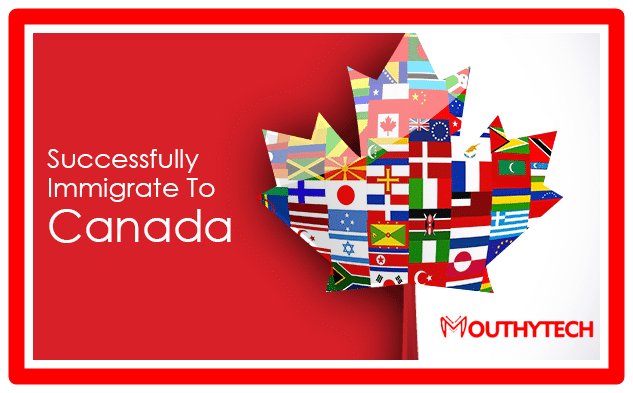Immigrate to Canada as a Food and Beverage Server
Did you know that when you immigrate to Canada, an experienced waiter can make up to $27,877 annually working as a food and beverage server? Over 1.7 million employees related to the tourism and hospitality sectors, including those for food and beverage servers, are being created each year in Canada.

The Great White North's largest manufacturing sector in terms of both GDP and jobs is the food and beverage processing sector. Moreover, it is the biggest consumer of Canada's unprocessed agricultural products. A strong staff is required in such a large and booming industry in order to keep things moving. However, there is a critical skills deficit of professionals in this area as a result of Canada's sizable retirement population. Therefore, Canada needs you if you work in this field and are looking for better pastures. You can apply for a wide range of employment, including those in food processing, harvesting, and serving.
In Alberta, Nova Scotia, Prince Edward, and Saskatchewan, food, and beverage servers are in demand. It's great that there are so many options for getting to Canada to work as a waiter, including the Express Entry system, Provincial Nominee Programs, Rural and Northern Immigration Program, Atlantic Immigration Program, and the International Experience Canada Program, which recently opened its application season for the 2023 Working Holiday. But because you have so many possibilities, applying for a visa can be complicated. But it's not necessary to be.
Top Province for Food and Beverage Servers to Immigrate to Canada
Waiters are in great demand in Canada's tourism and hospitality sectors, particularly Alberta, Nova Scotia, Prince Edward Island, and Saskatchewan. What you may expect to make in each province or territory is listed below:
|
Province |
Average Annual Salary |
|
Alberta |
$23,790 |
|
Nova Scotia |
$21,158 |
|
Prince Edward Island |
$21,938 |
|
Saskatchewan |
$21,450 |
Why Work in the Canadian Food and Beverage Industry?
Here are the top reasons to work in Canada's food and beverage industry.
Many Canadian provinces are in need of workers
The provinces with the most opportunities in Canada's food and beverage sector are listed below.
- Nova Scotia: Food Counter Attendants, Kitchen Helpers and Related Support Occupations Farm Workers, Food Servers, Food Service Manager
- Ontario: Butchers, Meat Cutters and Fishmongers, Food Counter Attendants, Kitchen Helpers and Related Support Occupations, Farm Workers, Food Servers
- British Columbia: Food Counter Attendants, Kitchen Helpers and Related Support Occupations, Farm Workers, Food Servers, Food Service Manager
- Nunavut: Food Servers
- Saskatchewan: Farm Workers
- Manitoba: Butchers, Meat Cutters and Fishmongers, Food Counter Attendants, Kitchen Helpers and Related Support Occupations, Farm Workers
- Prince Edward Island: Farm Workers
- New Brunswick: Food Counter Attendants, Kitchen Helpers and Related Support Occupations Food Counter Attendants, Kitchen Helpers and Related Support Occupations, Farm Workers
- Quebec: Butchers, Meat Cutters and Fishmongers, Food Counter Attendants, Kitchen Helpers and Related Support Occupations
- Alberta: Food Counter Attendants, Kitchen Helpers and Related Support Occupations
There are different pathways to Canadian permanent residency
Once you have a valid job offer and are sure you are eligible to immigrate to Canada, you can begin your immigration application. There are over 100 various immigration pathways and visa options for foreigners looking to work, travel or study in Canada.
An Abundance of jobs in Canada's Food And Beverage Industry
A fast online search will show you that Canada has hundreds of thousands of employment. Finding the perfect job in the province that will help you achieve your goal of becoming a permanent resident of Canada is the key. The two most crucial requirements for applying to become a permanent resident are having a legitimate job offer in a profession that Canada needs filled and being qualified to do it. A employment in a butcher shop, restaurant, or food industry could be obtained in Canada. Every type of worker in the food and beverage business can find something to do. Let's look at the roles that are open in the sector.
Jobs in the Canadian Food and Beverage Industry
There are jobs in the following sectors in Canada's food and beverage industry.
Food processing jobs
- Machine operator: No specific training is required for these positions as on-the-job training is often provided. However, previous experience can be helpful. Wages vary depending on the level of expertise required to operate the machinery but traditionally are between $13-$22 an hour.
- Food production labourer: From sausage wrappers to mushroom sorters, jobs in various food manufacturing facilities still require a lot of human capital. Wages are around $17 an hour.
- Equipment cleaner: Hygiene is essential, especially in countries like Canada with strict health codes and regular visits from health inspectors. Equipment cleaners make around $15 an hour.
- Food processing supervisor: Identifying, evaluating and controlling hazards during the food production process requires accountability, and wages reflect that. Supervisors in food production earn an average of $33 an hour.
- Quality control/assurance officer: Maintaining and ensuring standards are adhered to is vital, especially in the food industry, as mistakes can damage companies' reputations. QA officers typically earn around $24 an hour.
Jobs for butchers
- Industrial Butcher: Depending on experience, you can earn between $18 and $30 an hour as an industrial butcher in Canada. This is one of the most in-demand occupations at the moment. Industrial butchery is a difficult and respected profession, and not enough Canadians are entering. This is why the IRCC specifically targets foreign workers from this occupation for permanent residency.
- Retail Butcher: The more glamorous division of the profession, wrapping meats and interfacing with customers is the order of the day. Wages may range from $16 to $20 an hour depending on experience and responsibilities.
Chefs and Cooks
This group consists of cooks who prepare and cook meals and various delicacies as well as chefs at various levels who plan and oversee food preparation and cooking activities. They can work at bars, clubs, hotels, hospitals, care facilities for the elderly or people with disabilities, restaurants, and cruise ships. If you are an executive chef, you must possess a certification as a cook or chef as well as management training.
Food service managers
To keep operations going, businesses in the food industry need operations management personnel. You will also be responsible for overseeing finances, quality control, budgeting, and customer relations as a food service manager.
Food and beverages servers
Canada boasts a wide array of excellent restaurants since its cuisine scene is so lively. Therefore, it should be clear that this demands a steady flow of personnel. Waiters and food servers can find employment in a variety of settings, including restaurants, hotels, and other businesses.
Food counter attendants, kitchen helpers and related support occupations
The need for personnel in this group is extremely high. Counter clerks, cooks, kitchen helpers, food service assistants, and dishwashing personnel are among the available positions. These positions can be found at eateries, coffee shops, motels, fast food restaurants, cafeterias, medical facilities, and other establishments.
How to Immigrate to Canada
As was already mentioned, there are several ways to become a food and beverage server in Canada, including the Express Entry system, the Atlantic Immigration Pilot Program, the International Experience Canada Program, the Rural and Northern Immigration Program, and various Provincial Nominee Programs.
The Atlantic Immigration Pilot Program
Candidates seeking to immigrate to Nova Scotia, New Brunswick, Newfoundland, Labrador, or Prince Edward Island should apply through the Atlantic Immigration Pilot Program. It is an employer-driven initiative created to assist the province in finding skilled individuals to fill the present labor shortage. You can apply under one of the three programs in the pilot:
- Atlantic International Graduate Program
- Atlantic High-Skilled Program
- Atlantic Intermediate-Skilled Program
All three programs demand documentation of your English or French language skills, educational background, professional experience, and the ability to support yourself and your family.
The International Experience
Youths between 18 and 30 can travel, work, and obtain valuable job experience in Canada with the Working Holiday Visa. The primary prerequisites are that you either employ a recognized organization (RO) or that your nation must have an agreement with Canada that enables you to apply for an IEC (International Experience Canada) work permit. Additionally, you must fulfill the requirements of the pool you are applying for and the nation or territory of which you are a citizen.
There are 3 categories to choose from:
- Working Holiday
- Young Professionals
- International Co-op(internship)
You must apply to the Working Holiday category to immigrate as a server of food and beverages. This program's fantastic feature is that a job offer is not necessary.
Provincial Nominee Program
Provinces and territories may only participate in the Provincial Nominee Program (PNP). 11 of Canada's provinces and territories have their PNPs, which gives them the ability to propose people they believe are qualified to make an economic decisions to contribute to the area. To apply through one of these programs from the province or territory of their choice, applicants must match the particular requirements of the region's PNP and have a job offer. Candidates nominated by a province will earn 600 points added to their CRS score, which maximizes their chances of being granted permanent residency when they immigrate to Canada.
FAQs
Furthermore, here are the most frequently asked questions about immigrating to Canada as a food and beverage server.
What Kind of Work Permit Will I Need to Work in Canada?
There are two kinds of work permits that the Canadian government issues: Open Work Permits and Employer Specific Permits.
- Open Work Permit: Candidates can work for any employer in Canada - should they meet all requirements.
- Employer Specific Work Permit: Candidates can only be employed by one Canadian employer who provides a valid offer of employment, supported by an LMIA. This will have to be for a set period in a set location.
What Are the Work Permit Requirements for Food Service Workers?
Immigrating to Canada is possible for some food service workers, but only if you meet the requirements. These include:
- Education
- Work experience in a related position
- English or French language Proficiency
- No Criminal record
- Proof of sufficient funds
Final Thoughts
The time has come to get ready for your application procedure now that you are aware of your alternatives for employment in Canada's food and beverage industry. Don't hesitate any longer because there are numerous food and beverage service and food industry jobs available nationwide. Canada needs your skills!
What's Your Reaction?




















